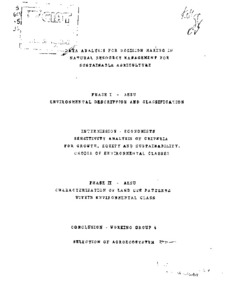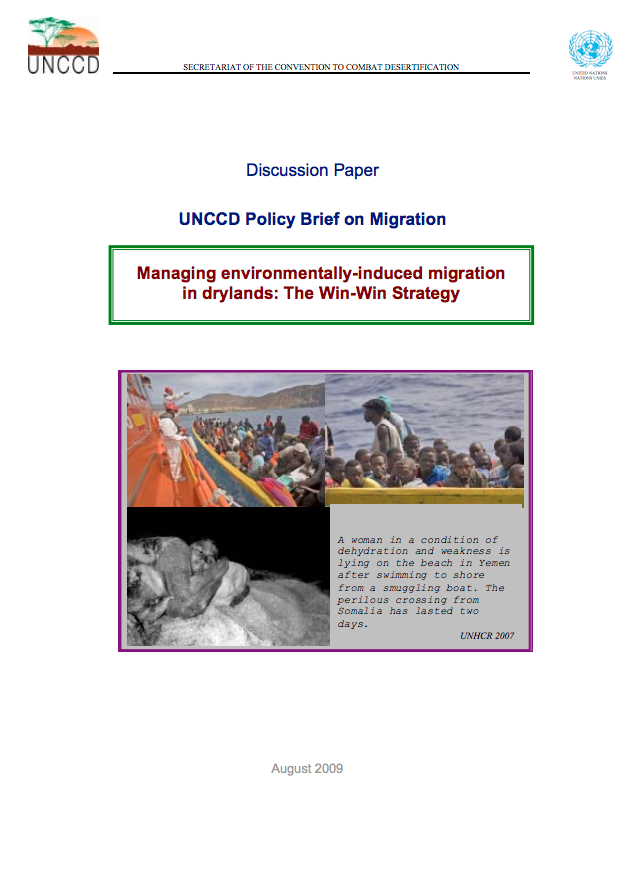Foodsheds and city region food systems in two West African cities
In response to changing urban food systems, short supply chains have been advocated to meet urban food needs while building more sustainable urban food systems. Despite an increasing interest in urban food supply and the flows of food from production to consumption, there is a lack of empirical studies and methodologies which systematically analyse the actual proportion and nutritional significance of local and regional food supplied to urban markets.
Managing environmentally-induced migration in drylands: The Win-Win Strategy
Human activities have resulted in unprecedented phenomena and severe impacts for the 21st century such as land degradation, natural resources scarcity, climate change, and a rapid decline in biodiversity. These alterations engender secondary effects such as political conflicts, disputes over resources, social disruptions and sudden shocks of catastrophic weather events which are becoming more frequent in critical regions of the world, particularly in drylands; and exacerbate threats for human, national and international security.
Sub-decree on Phnom Penh Land Use Master Plan for 2035
The objective and strategy-oriented development goal of Phnom Penh urbanization aim to:
- Orient land usage and ensure the existing potential value of the Phnom Penh capital city in sustainable, efficient and equitable ways, in order to support the socio-economic development, ensure food security, pulchritude and environmental quality.
- Orient the development with equality, equity and correspondence between Phnom Penh capital city, city, provinces of the country and other states’ cities.
Multi-agent modeling for water policy impact assessment: a road map
Water policies have a great impact upon different types of resources (water, land and soil resources; infrastructure and facilities; financial resources; environmental knowledge and information; etc.). They involve many individual or collective actors (users, managers, public or private companies, associations, etc.) as well as rules and norms of behavior that these actors are the recipients or agents. Complex systems, if any, these policies have several kinds of effects, expected and unexpected, direct and indirect effects, societal, economic, environmental and eco-systemic.
Eficiencia de la estrategia de gestión y localización de los residuos de la Comunidad de Madrid / Efficiency of management strategy and location of Madrid Autonomous Region waste
Globalization and the built environment in metropolitan São Paulo
This study investigates the process of globalization over the past decades as a process of technological progress in computer science and communication and as transformation in the world economic order. It identifies the political and economic causes of globalization and their impact on the social sphere of developing nations. In past decades social inequality has widened in these countries and their large cities. This article also identifies lifestyle changes in the city of São Paulo and their consequences in urban land occupation and use.
Recuperación de plusvalías para el desarrollo urbano: una comparación inter-americana
Los gobiernos locales desarrollan una amplia gama de políticas fiscales o regulatorias inspiradas en la idea de que el incremento en el valor de la tierra puede ser utilizado en beneficio de la comunidad, esto es, en la recuperación de plusvalías inmobiliarias. Este trabajo compara las experiencias de recuperación de plusvalías en América del Norte (Estados Unidos y Canadá) y América Latina, discutiendo las razones que han llevado a la utilización de distintas herramientas y los diferentes resultados y grados de éxito obtenidos en su implementación.
Transformações da área-alvo da Operação Urbana Vila Leopoldina-Jaguaré pelo mercado imobiliário: a verticalização residencial como motor de desenvolvimento urbano
Na cidade contemporânea, o ambiente construído vem se modificando, observandose a presença de áreas em transformação de uso e esvaziamento. Em São Paulo, a transformação do ambiente construído mediante esse processo, frente à dinâmica de ocupação do solo e reconfiguração de áreas pela via do mercado imobiliário, parece se consagrar como a principal força de produção do espaço urbano, apesar da existência de instrumentos urbanísticos de indução do desenvolvimento da cidade, articulado pela regulação do poder público municipal.
Spatial safeguarding efficiency in European countries and Serbia
The short review of the space protection efficiency in European countries and in Serbia has been given. The role of instruments and measures of land policy and corresponding combinations of stimulative and destimulative instruments of economic and fiscal policy, with provision of programming and other support in efficient space protection and reservation in European countries has been investigated.
VALUTAZIONI INTERSCALARI NEL PROCESSO PEREQUATIVO DEL PRG DI SIRACUSA
The implementation process of the Syracuse’s Master Plan is characterized by the widespread use of “urban negotiation”. The Muni- cipality has drawn up a protocol aimed at obtaining areas for facilities and public infrastructures in different areas basing on the rule of the transfer of a portion of land in return for the building permission for the remaining part. Since these areas are variously cha- racterized, the negotiation process may not be fair to Municipality or convenient to land owners.
La construcción de la periferia urbana en el Eje Atlántico Gallego a través de los hábitats de carretera. Lógica inmobiliaria, planificación y naturaleza adaptativa de lo urbano.
Resumen





